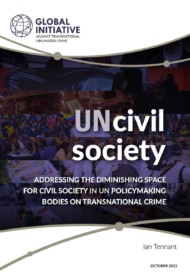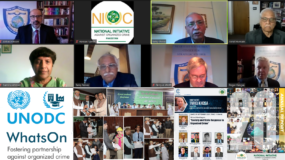Posted on 06 Apr 2023
With the support of the Global Initiative Against Transnational Organized Crime (GI-TOC), Pakistan’s Centre for Governance Research (CGR) has released a landmark report – ‘Pakistan UNTOC Review Process 2022: Civil society perspective’. This is the second country-focused public report ever issued by civil society on the implementation review of the UN Convention against Transnational Organized Crime (UNTOC), and the first in Asia.
After the long-delayed launch of the UNTOC’s Implementation Review Mechanism in 2020, Pakistan was selected in the first group of countries to be reviewed under the first review cluster – ‘Criminalization and jurisdiction’ – and is being peer reviewed by Djibouti and Tonga. Following the nomination of its national focal person, Additional Inspector-General of Police Ehsan Sadiq, the government of Pakistan has been undertaking its self-assessment process since early 2022.
The self-assessment phase is one of the key opportunities for civil society to engage with the government during the UNTOC review process. By helping review the convention’s implementation, civil society organizations can offer complementary information and fresh perspectives, share new data and deepen the scope of debates.
The CGR has been cooperating with the GI-TOC and the UN Office on Drugs and Crime (UNODC)’s Civil Society Unit to ensure that Pakistan’s review includes a meaningful process for engaging civil society and brings their perspectives in the national review process. Following a series of consultations undertaken by the CGR in 2021 and 2022, the organization published its report in March 2023, which outlines Pakistan’s key achievements regarding the review process. These include:
- The creation of a cross-sectoral Civil Society Alliance in Pakistan.
- The first ‘pilot initiative’ meeting in Asia under the UNODC’s ‘Stakeholder Engagement 4 U’ programme, convening members of the Pakistani government and law enforcement, and of the UNODC, the GI-TOC and the Civil Society Alliance.
- Meetings between the Pakistani government and civil society to contribute to the self-assessment questionnaire, and other policy processes, such as the adoption of the UNTOC’s Trafficking in Persons Protocol.
- Engagements at the UNTOC review mechanism’s multilateral Constructive Dialogues and the 2022 Conference of Parties in Vienna.
The report also outlines civil society’s substantive findings on the UNTOC’s implementation under the criminalization and jurisdiction cluster.
The publication of the CGR’s report follows the release of a report in March 2022 on the UNTOC’s implementation and impact in Canada, produced by the International Centre for Criminal Law Reform, which the GI-TOC also supports.
Despite the slow progress on the review mechanism, these examples from Pakistan and Canada show that civil society can make a meaningful contribution to evaluating the UNTOC’s implementation, by providing analysis and expertise on organized crime patterns and highlighting the experiences of affected communities. The GI-TOC is ready to work with other governments and civil society organizations as they consider how they can ensure these vital perspectives are included in their country’s review processes.
Our UNTOC hub provides a platform through which civil society groups from communities across the world can find information on how to engage and meaningfully contribute to the review mechanism.



